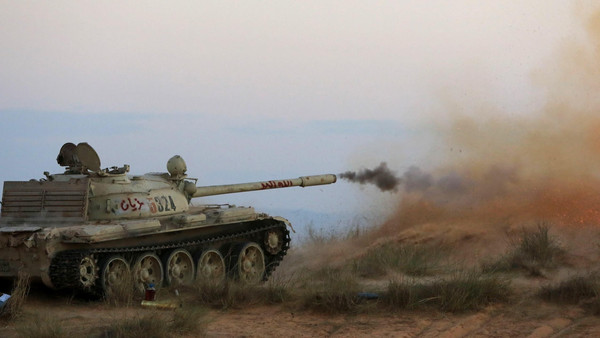Libyan Islamists reject U.N.-led peace talks

Libya’s Islamist militias on Tuesday vowed to continue military operations against the army of renegade general Khalifa Haftar and rejected U.N.-led talks peace with rivals.
In a statement posted by the so-called “Dawn of Libya,” the militias which control the capital Tripoli and the country’s senior religious institution, said: “No one, whoever it is, can stop Libyan Dawn’s military offensives.”
The militias accused their rivals of not being “serious” about a peace deal. “If peace advocates were serious, they would have called for dialogue when the criminal Khalifa Haftar, and whoever swore allegiance to him, began bombarding Benghazi in mid-May,” the statement said.
They said the only way to stop fighting is to disarm their rivals and prosecute their leaders.
After taking over the capital this year, the Islamist militias revived the once-ruling, Islamist-led parliament, despite the elected and internationally-recognized Libyan parliament’s outcry.
The Libyan Parliament immediately passed a resolution to disarm the militias in Tripoli and condemned the assault on the capital as an “act of terrorism.” But the assembly has little to no influence.
Dar al-Ifta, the religious body responsible for issuing religious verdicts in Libya, demanded the suspension of talks with the Libyan parliament. The parliament’s labeling of militias as terrorists and its call for international intervention are a violation of the constitution, said the religious body.
No one has the “right to negotiate” with Tobruk lawmakers because they have deviated from the principles of Islam and Libya, added Dar al-Ifta.
Libya is currently witnessing its worst unrest since the toppling of Muammar Qaddafi in 2011, which in return paved the way for the emergence of heavily-armed rebels seeking power.
Shortly after the Libya Dawn statement, the Dar al-Ifta body, which is in charge of issuing religious edicts and which is led by hard-liner al-Sadek al-Gharyani, said that Libya’s Muslim “clerics demand the suspension of talks with the Tobruk parliament,” the Associated Press reported.
Dar al-Ifta said the suspension was pending a ruling by the country’s Supreme Constitutional Court on whether the Tobruk-based, elected parliament has violated the constitution by calling the militias “terrorists and urging for international intervention” in the crisis.
The religious body said no one has “the right to negotiate” with Tobruk-based lawmakers and alleged that they deviated from the principles of Islam and Libya.
Libya’s 2011 revolt gave rise to a patchwork of heavily armed and increasingly unruly militias, which emerged from the rebel groups that led the uprising against Qaddafi.
The current crisis is rooted in the successive Libyan governments’ dependence on those militias for restoring order in the absence of a strong national army or police force.
Source: Al-Arabiya
